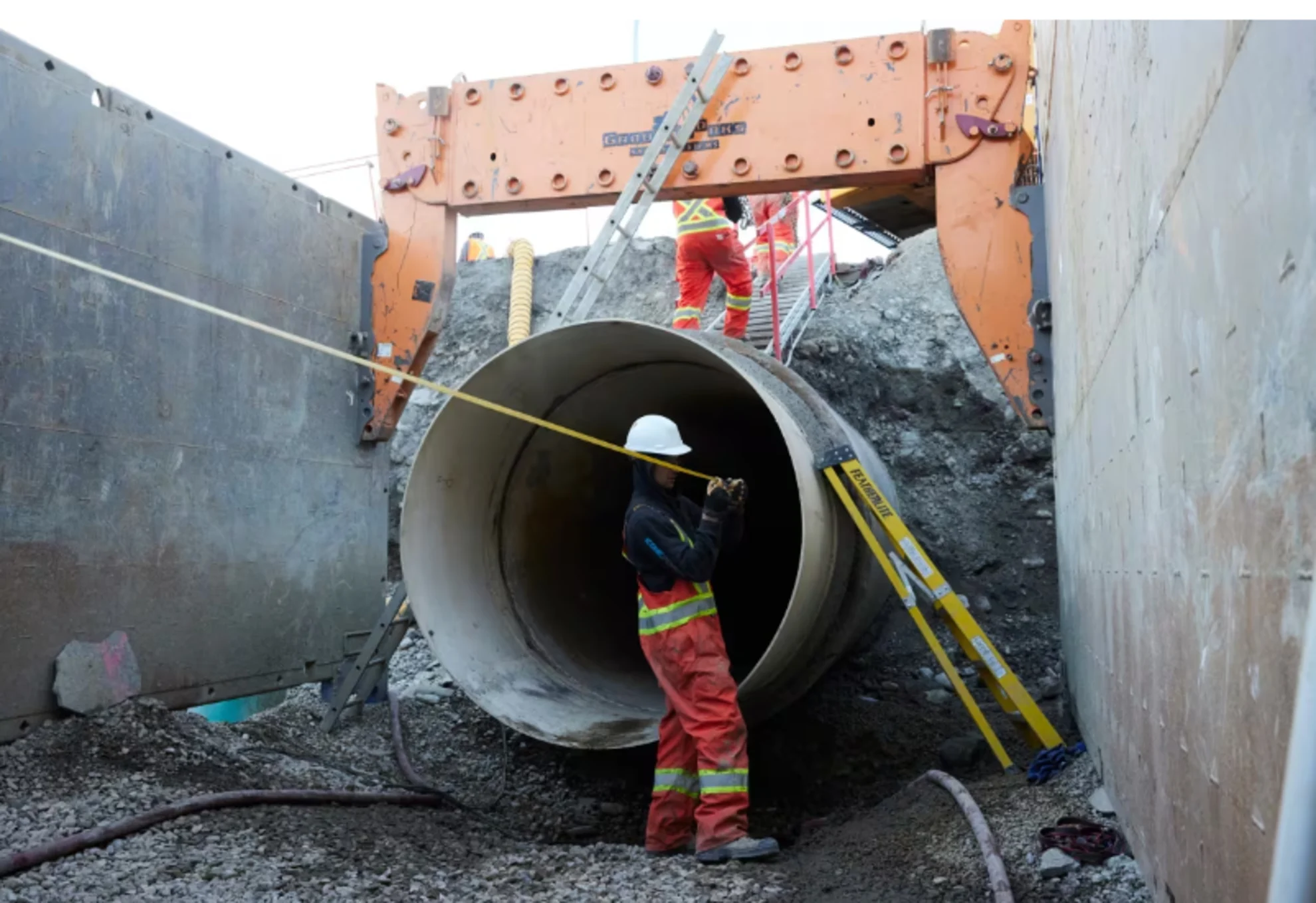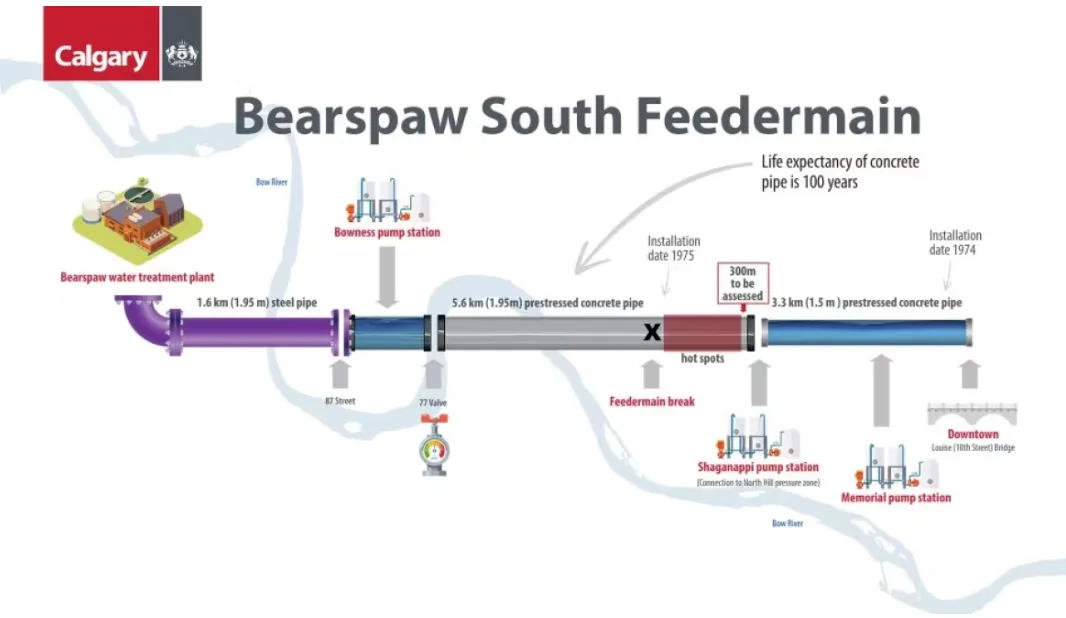
Calgary's water restrictions could last weeks as crews find more problems
City officials say five further locations require repair along a water feeder main that supplies over half of Calgary's drinking water.
The additional breaks mean repairs could take another three to five weeks, officials said at a press conference Friday afternoon.
Sue Henry, Calgary Emergency Management Agency (CEMA) chief, called the situation "the most dramatic and traumatic break of the feeder main they have ever seen."
"The pipe is not safe to bring into service without these repairs," she said. "Our only choice is to stay the course with our current water restrictions for three to five weeks further."
The additional breaks were discovered after a robot was sent into the feeder main to assess roughly 300 metres of the pipe. The robot uses sensors to collect data that show problems with the integrity of the pipe.
DON'T MISS: Meet the young environmentalists holding Calgary leaders to account
The robot found five "hot spots" where significant breakage had occurred in the prestressed steel wires used to reinforce the concrete pipe.
"Our assessment shows the hot spots cannot safely withstand the amount of pressure we need to run through the feeder main," said Francois Bouchart, the director of capital priorities and investment with the city's infrastructure services department.
"If we were to complete current repairs and restore the water feeder main now, it would be at high risk of additional catastrophic breaks."

Work was paused on the site of a water main break after two people were injured. (Monty Kruger/CBC)
The 5 hot spots
Bouchart said the five hot spots are located southeast of the current break, west of the Shaganappi pump station, which is located in Edworthy Park at the bottom of Shaganappi Trail.
He said the city has determined that a significant contributing factor of the feeder main break was the breakage of steel wires, which are coiled "like a slinky" within the inner layer of concrete pipe.
"As we saw in our current break, when the wires break in multiple places, it weakens the pipe and can lead to a catastrophic pipe failure," he said. "The degree of breakage we're seeing in these sections of pipe require emergency repair."
Nancy Mackay, Calgary's water services director, who also spoke at Friday's news conference, said the city has seen "excellent co-operation" from both residents and businesses when it comes to reducing water use.
"The next few weeks will be critical for us. Over the past several days, we've been working with our large industrial commercial customers to ask them to do whatever they can to reduce water," Mackay said.
"With today's situation, we are now contacting some customers to ask them to stop some operations and some activities if we need to. The city has the ability to turn off water to a business if they are not complying with that ask. This would be a last resort and one we are prepared to take if need be."

Following further investigation of the feeder main, the city says that 'significant additional damage has been found' and other sections of the pipe now also need repairs. (City of Calgary)
Situation 'urgent and catastrophic,' says mayor
Earlier Friday, Calgary Mayor Jyoti Giondek warned that the city could be forced to bring in mandatory indoor water restrictions if water usage continues at its current rate, calling the situation "urgent and catastrophic."
"We don't know what that looks like. I really don't want to get to that stage," Gondek said. "But if we can't do our part by banding together, there may be some restrictions that come into place."
The Bearspaw south water main, which is 11 kilometres long and as wide as two metres in parts, suffered a break on June 5 that temporarily left hundreds of homes and businesses in the city's northwest without water. The pipe failure triggered a fire ban and mandatory outdoor water restrictions.
SEE ALSO: Rain-weary South Floridians await sun after days-long deluge
Henry said the older and smaller Glenmore treatment plant has been carrying a massive load trying to supply water to the rest of the city without its companion plant: the Bearspaw Water Treatement Plant, which draws water from the Bow River and provides roughly 60 per cent of the city's treated water supply.
She said the city has begun preparations to bring in redundant parts, as well as putting personnel and equipment on standby, in a bid to respond quickly if an issue arises.
"We essentially want to bubble wrap that Glenmore treatment plant so we keep it as safe, protected, as possible, knowing the heavy need that we are placing on it and will continue to place on it," she said Friday afternoon.
WATCH: Dishwasher or sink? Tips for conserving water
Water usage has been increasing every day since Saturday, three days after the pipe broke. On Thursday, 480 million litres — considered the sustainable threshold — was used across the city.
That's less than the amount used the previous day, but according to the mayor, it's not enough.
"If our water usage continues to trend up and our water can't keep up, the taps will run dry at some point," Gondek said.
There's still no timeline for when that could happen, or how many days of water supply the city has, but the mayor did have a response for those wondering.
"The only answer that the more water we use, the sooner those taps run dry," Gondek said. "You and I, we cannot give up on our conservation efforts right now. We need to do better."
Work on the feeder main site was temporarily paused overnight Wednesday and into Thursday morning when two people were injured on site. Repair work began again on Thursday afternoon.
Thumbnail image courtesy of the City of Calgary via CBC News.
This article, written by Jim Brown, was originally published for CBC News with files from Omar Sherif and Lily Dupuis.